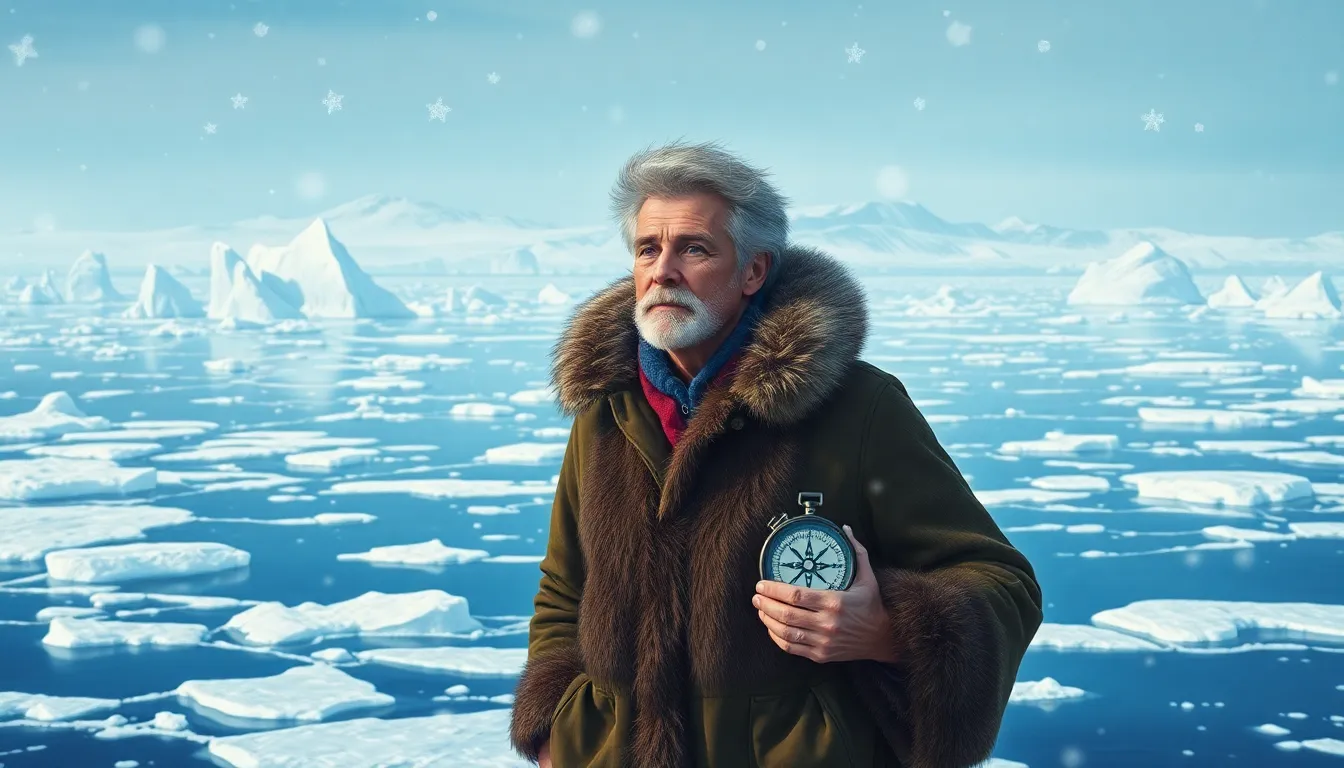Arctic explorations have long captured the imagination of adventurers and scientists alike. Picture this: brave souls bundled in layers of clothing, battling frigid winds and dodging polar bears while searching for the secrets hidden beneath the ice. It’s not just a winter wonderland; it’s a realm of mystery and discovery that promises both peril and excitement.
Overview of Arctic Explorations
Arctic explorations encompass a rich history of human endeavor in one of Earth’s most challenging environments. The pursuit of knowledge about the Arctic has driven explorers since the 16th century, as they sought new trade routes and geographical insights. Early adventurers, such as Martin Waldseemüller, contributed to cartographic advancements by mapping previously uncharted territories.
Significant expeditions took place in the 19th century, showcasing the resilience of those brave enough to navigate the harsh elements. Notable figures like Sir John Franklin led expeditions seeking the Northwest Passage, a vital sea route. These efforts, although fraught with peril, highlighted the determination and courage inherent in exploration.
Modern Arctic explorations utilize advanced technologies to enhance research capabilities. Satellite imagery provides critical data on ice formations, while icebreakers facilitate navigation through polar waters. Scientists employ robotic submersibles to study the ocean’s depths, uncovering essential information concerning climate change and marine ecosystems.
Global interest in the Arctic has surged due to its vast natural resources and unique biodiversity. Countries have intensified research efforts, exploring potential oil, gas, and mineral deposits. National policies increasingly reflect the need for sustainable practices as exploration expands.
Historical records illustrate the significance of collaborative efforts among nations in Arctic research. International treaties, such as the Arctic Council, promote cooperation on various issues, including environmental protection and indigenous rights. Scientific collaborations enhance understanding of Arctic conditions, leading to comprehensive strategies addressing climate challenges.
Historical Significance

Arctic explorations hold immense historical significance, revealing the resilience and perseverance of early adventurers. These journeys laid the foundation for extensive geographical knowledge and an understanding of trade routes.
Early Expeditions
Early expeditions began in the 16th century, with explorers like Martin Waldseemüller mapping uncharted territories. Driven by a desire to find new trade routes, adventurers faced harsh Arctic conditions to navigate the icy waters. Notable figures emerged during the 19th century, including Sir John Franklin, who led critical missions to discover the Northwest Passage. Such voyages contributed to the expansion of maritime knowledge, leading to future explorations in the region.
Key Discoveries
Key discoveries during Arctic explorations transformed scientific understanding. The discovery of the North Pole by Robert Peary in 1909 marked a significant milestone in exploration history. Research uncovered unique ecosystems, including diverse marine life and glacial structures. Data collected from these expeditions highlighted the Arctic’s climate, foreshadowing contemporary climate change discussions. Additionally, expeditions led to the identification of potential natural resources, which spurred geopolitical interest in the region’s future.
Modern Arctic Explorations
Modern Arctic explorations leverage advanced technology and collaborative efforts for significant discoveries. Researchers utilize cutting-edge tools to navigate and study this unique environment.
Technological Advances
Satellite imagery plays a crucial role in mapping and monitoring Arctic changes. Robotic submersibles enhance underwater exploration, gathering data on marine ecosystems. Innovations such as autonomous drones provide real-time surveillance, making it easier to monitor wildlife and ice conditions. These tools significantly improve research capabilities compared to previous methods. Increased accessibility allows scientists to collect valuable data on climate change, helping to inform global discussions.
Notable Expeditions
Several notable expeditions have shaped modern understanding of the Arctic. The International Polar Year in 2007-2008 coordinated global research efforts, resulting in groundbreaking findings on ice loss. The MOSAiC expedition, which started in 2019, involved an icebreaker drifting across the Arctic for a year to study the ecosystem in-depth. Researchers from multiple countries contributed to this collaborative effort, underscoring the importance of shared knowledge. Each expedition builds on the last, creating an evolving narrative of exploration and discovery in this vital region.
Environmental Impact
Arctic explorations significantly influence the environment, especially concerning climate change and conservation efforts. These expeditions yield crucial insights into ecological balance.
Climate Change Effects
Climate change impacts the Arctic region at an alarming rate. Temperatures in the Arctic rise nearly twice as fast as the global average, leading to widespread ice melting. Consequently, the loss of sea ice disrupts ecosystems, affecting species like polar bears and seals that depend on ice habitats. Increased greenhouse gas emissions exacerbate these effects, contributing to ocean acidification and altering marine food webs. Researchers often note that changes in the Arctic serve as a barometer for global climate trends, emphasizing the urgency of addressing these challenges.
Conservation Efforts
Conservation efforts focus on protecting Arctic ecosystems facing human-induced threats. Various international agreements aim to safeguard marine biodiversity through sustainable practices. Programs like the Arctic Council’s Action Plan protect the Arctic’s sensitive habitats while promoting indigenous rights. Conservationists advocate for the establishment of marine protected areas to mitigate exploitation of resources. Many scientists highlight the critical need for collaboration among nations to develop effective strategies that address the unique environmental challenges posed by the region. Demonstrating this commitment helps preserve the Arctic for future generations while advancing research efforts that inform global climate action.
Future of Arctic Explorations
Future Arctic explorations promise groundbreaking research and significant challenges. Continuous advancements in technology enhance the scope of Arctic studies.
Research Opportunities
Innovations in satellite imagery deliver unprecedented access to data on climate change. Robotic submersibles enable scientists to explore previously unreachable marine environments. Collaborations among nations foster collaborative research projects, amplifying knowledge on Arctic ecosystems. Moreover, increased interest in natural resources encourages exploration for sustainable practices. Emerging research areas include biodiversity monitoring and the effects of climate change on polar regions. Expeditions like the International Polar Year and MOSAiC underscore the importance of shared findings, providing critical insights into climate resilience and adaptation strategies.
Challenges Ahead
Increasing temperatures lead to rapid ice melting, complicating exploration efforts. Navigating treacherous conditions requires advanced training and expertise. Political tensions over territorial claims necessitate diplomatic engagement to ensure peaceful collaboration. Additionally, balancing resource extraction with environmental preservation poses ethical dilemmas for explorers. Adverse weather can hinder accessibility, disrupting planned research as storms and shifting ice make logistics challenging. Ensuring effective international cooperation becomes paramount to address these multifaceted issues and safeguard the Arctic environment.
The Arctic remains a frontier of exploration and discovery. As researchers and adventurers continue to navigate its icy expanse, the interplay between human curiosity and environmental stewardship becomes increasingly vital. Innovations in technology and international collaboration pave the way for deeper understanding of this unique ecosystem.
The challenges posed by climate change and geopolitical tensions demand a collective effort to protect the Arctic’s fragile environment. Future explorations will not only contribute to scientific knowledge but also shape policies aimed at sustainable resource management. The journey into the Arctic is far from over; it’s an evolving narrative that holds the key to addressing some of the planet’s most pressing issues.
